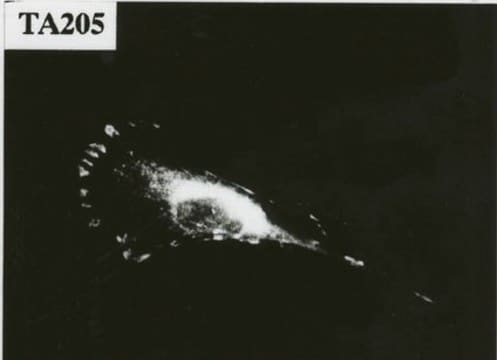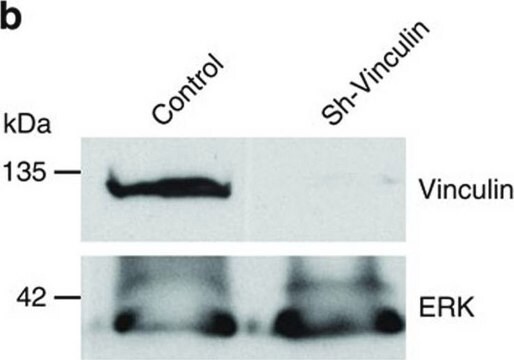SAB4200694
Anti-Talin antibody, Mouse monoclonal
clone 8D4, purified from hybridoma cell culture
Sinónimos:
Tln
About This Item
Productos recomendados
biological source
mouse
Quality Level
antibody form
purified immunoglobulin
antibody product type
primary antibodies
clone
8D4, monoclonal
form
buffered aqueous solution
species reactivity
Xenopus, rat, chicken, human, bovine, sheep, hamster
concentration
~1 mg/mL
technique(s)
ELISA: suitable
flow cytometry: suitable
immunoblotting: 1-2 μg/mL using whole extract of hamster CHO cells.
immunofluorescence: 2.5-5 μg/mL using chicken UMNSAH/DF1 cells.
isotype
IgG1
shipped in
dry ice
storage temp.
−20°C
target post-translational modification
unmodified
Gene Information
chicken ... Tln1(395194)
human ... TLN1(7094)
rat ... Tln1(313494)
General description
Immunogen
Application
- immunoblotting
- immunofluorescence
- fluorescence-activated cell sorting (FACS)
- enzyme-linked immunosorbent assay (ELISA)
Biochem/physiol Actions
Physical form
Disclaimer
¿No encuentra el producto adecuado?
Pruebe nuestro Herramienta de selección de productos.
Storage Class
10 - Combustible liquids
wgk_germany
WGK 1
flash_point_f
Not applicable
flash_point_c
Not applicable
Certificados de análisis (COA)
Busque Certificados de análisis (COA) introduciendo el número de lote del producto. Los números de lote se encuentran en la etiqueta del producto después de las palabras «Lot» o «Batch»
¿Ya tiene este producto?
Encuentre la documentación para los productos que ha comprado recientemente en la Biblioteca de documentos.
Nuestro equipo de científicos tiene experiencia en todas las áreas de investigación: Ciencias de la vida, Ciencia de los materiales, Síntesis química, Cromatografía, Analítica y muchas otras.
Póngase en contacto con el Servicio técnico








